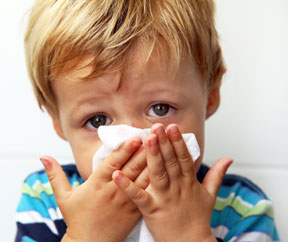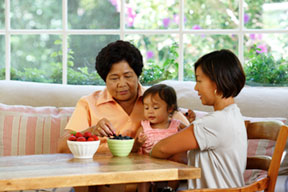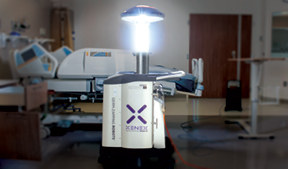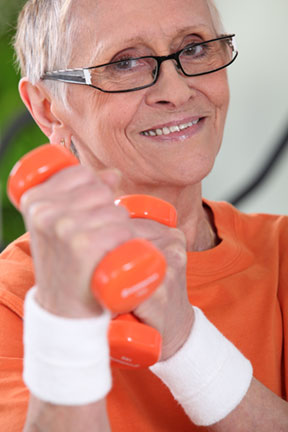 | Keep Real Cooties at Bay (315) (NewsUSA) - The infectious disease known to children as "cooties" may not really exist, but the idea of advancing germs jumping from classmate to classmate isn't very far off. Despite all efforts to the contrary, schools tend to be a receptacle for all kinds of bad bacteria and germs. Most harmful bacteria are absorbed through the mouth, which can lead to ear infections, sore throats, colds, even gum disease. Kids will be kids, and sometimes it's impossible to stop them from shoving every little object into their mouths -- which is why germ-related illness, like cooties, can spread quickly. While chants of "circle circle, dot dot, now you have your cootie shot" won't do much to prevent germs in schools, a real solution has arrived from New Zealand. Researchers at BLIS Technologies and Otago University in New Zealand recently discovered a new type of probiotic that, in early clinical trials, can help keep cooties away. Unlike current probiotics on grocery store shelves meant for digestion, this probiotic is for the mouth. There, beneficial probiotic bacteria can help defend kids and adults from germs that cause a variety of unpleasant conditions -- sore throats, ear aches, persistent sniffles and more. In the U.S. this new probiotic is now being introduced at Walgreens stores under the TheraBreath label. TheraBreath Multi Symptom Oral Care Probiotics is the first product that effectively targets hostile bacteria in the oral cavity and throat, where the majority of illness-causing germs enter the body. The probiotic also protects teeth from bacterial cavities and tooth decay as it reduces plaque and biofilm. The patented strain has been shown to break up the natural glue that allows these substances to stick to tooth and gum tissue. As biofilm is removed, teeth even regain a natural whiter luster. TheraBreath improves overall gum health and strengthens germ resistance. For more info about oral care, visit www.therabreath.com/probiotics. |
.
Translate
jueves, 4 de abril de 2019
Keep Real Cooties at Bay
Outdoor Play Time Can Enhance Children's Sleep
 | Outdoor Play Time Can Enhance Children's Sleep (331) (NewsUSA) - Parents are hearing a lot these days about the hazards of today's "indoor childhood," with kids spending countless hours on electronic media. But one consequence may be going undetected. National Wildlife Federation's new parent guide highlights the connection between the time kids spend playing outdoors and sleep deprivation. According to NWF Guide, young children and teens are losing anywhere from 10 to 14 hours of sleep a week. Sleep deprivation can stunt physical growth, impede performance at school, lead to anxiety or depression and contribute to future health problems like obesity. Making matters worse, children are generally bad judges of the amount of sleep they really need. Outdoor time improves a child's sleep in three critical ways. Natural light from the sun regulates the body's internal "sleep clock," which makes children more alert during the day, and tired at night. Research also demonstrates that natural, green settings are relaxing and calming for children, and yield other cognitive benefits. Lastly, outside exercise develops better motor skills and encourages creativity. "While there is no single solution to childhood sleep deprivation, part of having a well-rested child involves trading some screen time for green time," says Kevin Coyle, NWF vice president of education and training, and author of NWF Guide. "More play time in natural settings can help kids get a high-quality night's sleep." To foster awareness and healthier amounts of pillow time, the NWF guide "Green Time for Sleep Time" offers parents helpful advice about improving sleeping habits by exposing children to more outdoor play time every day. NWF's parents guide advocates trimming down children's consumption of electronic entertainment and balancing it with some outdoor play time every day. It's also important to disengage kids from their tech devices at least an hour before bedtime so they can settle down and be ready for the sand man to arrive. Green Time for Sleep Time is available from NWF, along with activities to make outdoor time fun time at www.beoutthere.org. |
WGU Texas Declares, "No Parent Left Behind"
 | WGU Texas Declares, "No Parent Left Behind" (398) (NewsUSA) - As kids are prepped for school each day, the last thing parents have time to consider is heading to school themselves. But, they should be?. More than 3 million Texas residents, many of them parents, have started but not finished a college degree; yet by 2018, an estimated 63 percent of all jobs will require at least some post-secondary education. A bachelor's or master's degree can bring career advancement, increase job security and enhance earning potential, so how can busy parents finish their degrees and avoid being left behind? The prospect of heading back to college can be a daunting one. There are a number of college options, but few that are affordable and flexible enough to meet the needs of working adults. Texas's new online university, WGU Texas, Texas.wgu.edu, is designed to meet the needs of students with family and work obligations, and to do it affordably. Nonprofit and endorsed by the state, WGU Texas offers 50 accredited bachelor's and master's degree programs in the high-demand career fields of business, information technology, teacher education, and health professions, including nursing. WGU Texas's programs are structured to allow students to move quickly through what they already know and to focus on what they still need to learn. WGU Texas students advance by demonstrating what they know, not by logging time in class. This learning model, which includes the support of a dedicated mentor, is called "competency-based education," and it represents a truly new and innovative approach to higher education. At less than $3,000 per six-month term (and no limit on the number of courses per term), WGU Texas is about half the cost of most other online universities and considerably less than most of Texas's public universities. Because students can leverage their experience and prior college to help them move as quickly through courses as they are able, the average time to complete a bachelor's degree at WGU Texas is just two-and-a-half years -- an average cost of about $15,000. It's likely that you are already encouraging your kids to plan for college. And, as all good parents know, kids learn best by example. Finishing a degree means more than career advancement and better earning potential -- it is a priceless accomplishment that demonstrates the value of education to your children. This school year, don't be left behind.
Note to editors: Great for regional use in Texas. |
8 Tips to Help Seniors Conquer Stress
 | 8 Tips to Help Seniors Conquer Stress (334) (NewsUSA) - As boomers retire from their jobs at unprecedented rates in the U.S., you'd think they'd be spending their free time with friends, lingering over the morning newspaper and coffee or taking January vacations in a warm place. But many seniors are finding themselves in a predicament that few anticipate in retirement: parenting for a second time. Census reports indicate that 2.7 million grandparents are responsible for their grandchildren. Their added duties may be fulfilling, but they may be stressful, too. In fact, many things can trigger stress among retired adults -- paying bills on a fixed income, failing health, caring for ill parents or spouses, or even grandparenting. Excessive stress can lead to serious health problems. "When stressed, the body releases substances such as cortisol and adrenaline that affect every organ and can cause muscle tension, insulin secretion and increased heart rate," said Arthur Hayward, M.D., a geriatrician and the clinical lead physician for elder care with Kaiser Permanente's Care Management Institute. "You can't avoid stress, but managing it can help preserve your health and well-being," Dr. Hayward added. He recommends identifying and understanding the cause of your stress and finding ways to relieve it, such as these eight tips: 1. Pace yourself. Don't take on too much. Be aware of your limitations. 2. Set realistic goals and expectations, and don't be afraid to ask for help. 3. Plan time for yourself. Recharge your batteries. 4. Exercise and eat a balanced diet. Get plenty of fruits, vegetables and whole grains. 5. Try relaxation techniques such as meditation or yoga. 6. Get enough sleep. If you have problems sleeping, talk to your doctor. Drinking caffeinated beverages and alcohol can affect your ability to get a good night's sleep. 7. Talk with a loved one or write in a journal. 8. Stay positive. Positive thoughts can make a difference, such as "I am hopeful" or "Things will be better." For more information, go to kp.org/healthyaging. For questions or advice about a specific condition, talk to your physician. |
8 consejos para que las personas de la tercera edad puedan ganarle al estrés
 | 8 consejos para que las personas de la tercera edad puedan ganarle al estrés (392) (NewsUSA) - A medida que los nacidos durante la explosión de natalidad de la posguerra se jubilan de sus trabajos en índices sin precedentes en los EE. UU., uno tiende a pensar que ellos estarían disfrutando de su tiempo libre con amigos, leyendo el periódico mientras toman café por las mañanas o tomándose vacaciones en enero en algún lugar cálido. Pero muchas de estas personas se encuentran actualmente ante un dilema que pocos prevén para esa etapa de la vida: volver a criar niños. Los censos indican que 2,7 millones de abuelos son responsables del cuidado de sus nietos. Estas nuevas responsabilidades pueden ser gratificantes, pero también causan mucho estrés. De hecho, hay muchas cosas que pueden generarles estrés a los jubilados; pagar las cuentas con un ingreso fijo, los problemas de salud, el ocuparse de parientes o esposos enfermos, e incluso el ser abuelos. El estrés en exceso puede provocar problemas serios de salud. "Al estar estresado, el cuerpo libera sustancias como cortisol y adrenalina que afectan a todos los órganos y que provocan tensión en los músculos, secreción de insulina y un aumento del ritmo cardíaco", señaló Arthur Hayward, médico geriatra y Jefe del cuerpo de médicos del Instituto para el Cuidado de Ancianos de Kaiser Permanente. "No es posible evitar el estrés, pero manejarlo puede ayudarlo a preservar su salud y bienestar", añadió el Dr. Hayward. Recomienda identificar y comprender la causa del estrés y buscar formas de liberarlo, como alguna de los siguientes consejos: 1. Modere su propio ritmo. No trate de abarcar demasiado. Sea consciente de sus limitaciones. 2. Fíjese objetivos y expectativas realistas, y no tenga miedo de pedir ayuda. 3. Planifique tiempo para usted mismo. Recargue sus baterías. 4. Haga ejercicio y siga una dieta balanceada. Coma muchas frutas, verduras y alimentos integrales. 5. Intente practicar técnicas de relajación como meditación o yoga. 6. Duerma lo suficiente. Si tiene problemas para dormir, consúltelo con su médico. El tomar bebidas con cafeína y alcohol puede afectar su capacidad para dormir bien por la noche. 7. Hable con alguno de sus afectos o escriba en un diario personal. 8. Sea positivo. Los pensamientos positivos pueden hacer la diferencia, como "Tengo esperanza" o "Las cosas van a mejorar". Para más información, consulte kp.org/healthyaging. Para preguntas o consejos sobre una enfermedad específica, consulte a su médico. |
5 Things You Don't Know About Superbugs
 | 5 Things You Don't Know About Superbugs (402) (NewsUSA) - The news is full of headlines about the flu, CRE and the measles. The Centers for Disease Control and Prevention recently reported that Clostridium difficile (C.diff) infections have doubled in recent years. If you or a loved one needs to go to the hospital, how do you avoid contracting a deadly infection? There's no disputing the facts -- infections are caused by microorganisms like C.diff, MRSA, VRE, CRE and norovirus. These antibiotic-resistant germs lurk on high-touch surfaces in hospitals and health care facilities -- and some, like C.diff, can live for months on bedrails and tray tables. With new and deadlier viruses and bacteria emerging everyday, what do you need to know to avoid getting sick? 1. Superbugs are everywhere inside hospitals, skilled nursing facilities and even surgery centers. Research shows that even after the most thorough manual cleaning, 50 percent of the surfaces in a room are still contaminated enough to cause infection. 2. Do you need that antibiotic? Is it the right one? Don't use antibiotics for viral ailments, and don't insist on them for children's viral infections. C.diff reproduction in a patient's intestines is aided by broad-spectrum antibiotics and proton-pump inhibitors. 3. Be prepared, and carefully research the hospital where you are being treated. Look at the hospital's patient safety record. A good resource is www.hospitalsafetyscore.org. Look at its infection rates -- available at www.hospitalcompare.hhs.gov. 4. Hand hygiene may save your life. When you are in the hospital, follow hand-hygiene protocol carefully, and make sure every health care worker (such as doctors and nurses) washes their hands before they touch the patient. 5. Superbugs can be destroyed before they harm patients. Properly disinfecting a patient room with a Xenex germ-zapping robot adds only 10 minutes to room turnover time, and hospitals using Xenex UV light robots are reporting significant decreases in their hospital acquired infection rates. If you or a loved one is going to the hospital, make sure the room has been properly disinfected. Insist on only going to a hospital that uses Xenex germ-zapping robots to disinfect its rooms. New antibiotics may be part of the solution for solving the superbug crisis, but getting the germs out of the patient environment before they make people sick is what can and should be done right now. It only takes a matter of minutes -- and it may save your life. Visit www.xenex.com to learn more. |
6 Myths About Pet Allergies
 | 6 Myths About Pet Allergies (419) (NewsUSA) - By gaining a better understanding of the allergies caused by pets, you may be able to find a healthier coexistence with your furry friend. According to The Humane Society, 62 percent of American households have at least one pet. Yet, an estimated 31 million Americans are allergic to animals, including up to 30 percent of those who have asthma. Here's what you should know about pet allergies: Myth 1: It's only pet hair that causes allergies to flare up. Not true. Pet hair is a nuisance and causes allergies, as it contains saliva or other pet proteins. Allergic reactions to pets are actually caused by pet proteins contained in pet dander, such as microscopic skin flakes, saliva and urine. Overactive immune systems in those with allergies attack these otherwise harmless substances. Myth 2: Continuous exposure to animals will eventually desensitize you to them. Not only is this not true, but in some cases the opposite is true. If you have a confirmed allergy to animals, it usually will not get better through increasing exposure. In fact, it may get worse. Myth 3: With the right pet breed, allergy problems go away. Not true. All cat or dog breeds produce dander. However, some breeds are believed to be better for allergy sufferers than other breeds. Typically the best breeds are those that shed the least fur and/or are the most frequently bathed. Also, smaller dogs produce less saliva than do bigger dogs. Myth 4: Small animals are not a problem for allergies. Wrong. Hamsters, guinea pigs, birds and other warm-blooded mammals can also trigger asthma and allergies in people with allergies to animal dander, according to the U.S. Environmental Protection Agency. Myth 5: Outside the home, you shouldn't have pet allergies. Not necessarily. Because of their microscopic size and jagged shape, pet allergens easily stick to clothing and other fabrics and are carried to other locations. Animal dander -- in sufficient levels to cause allergies -- can be found in many public places such as the workplace, classrooms and hospitals, according to the American Lung Association. Myth 6: An air purifier will help with pet allergies. It depends on the air purifier. Only a high-performance air purifier can help. Some allergy sufferers report that small, low-quality air cleaners make little or no difference at all. However, many allergy sufferers report that their IQAir air purifier, in combination with improved cleaning methods, has reduced or completely eliminated their allergic reactions to pets in their homes. For more information, visit the IQAir website at www.iqair.com. |
4 Basic Exercises to Help Older Adults Improve Strength and Balance
 | 4 Basic Exercises to Help Older Adults Improve Strength and Balance (451) (NewsUSA) - As you grow older, being physically active is one of the most important things you can do to stay healthy. Whether you're well into your golden years, a baby boomer or younger, studies show regular exercise can lower your risk of heart disease, some cancers, diabetes and dementia. It also helps improve your mood, energy level and overall well-being. "The great thing is, no matter what your age, size or fitness level, it's never too late to start exercising," said Jaza Marina, M.D., a Kaiser Permanente physician who specializes in elder care. "We strongly recommend seniors do exercises that maintain strength, balance and flexibility. Our goal is to reduce their risk of falls and injuries, so they can stay healthy and independent." Dr. Marina advises that good ways to exercise include low-impact aerobic activity, swimming, tai chi and yoga if you're physically able. "We have 80-year-olds who run 5k or 10k races. Everyone is different, so pick an exercise that you enjoy." She believes walking is probably the easiest exercise. All you need is 30 minutes a day, five times a week. If that's too much, you can break that up -- 10 minutes in the morning, 10 in the afternoon, and 10 in the evening. Some seniors walk at their local indoor shopping mall. "The important thing is to get off the recliner, turn off the T.V. and get active," said Dr. Marina. Below are four basic exercises to get you started. 1. Knee bends. Holding on to a sturdy chair or counter at your side, keep your back straight, feet on the ground and gently bend your knees and lower your body. Then, raise your body back up. It's a slight squat but not a deep one. Repeat 10-15 times. 2. Heel raises. Holding on to a chair or counter at your side, raise up on toes slowly and then lower the heels to the ground slowly. Heel raises strengthen the calf muscles. Repeat 10-15 times. 3. Side leg raises. Holding on to a chair or counter at your side, raise one leg out to the side and bring it back down. Repeat 10-15 times and switch to other leg. 4. Sit to stand. If you're able -- sit in a chair and rise to a standing position with arms stretched in front of you. Make sure the chair is in a stable position or against a wall so it won't fall over. Sit back down and repeat 10 times. Kaiser Permanente offers exercise classes at several of its medical facilities. To find classes in your area and for further information about these exercises, visit kp.org. Also, talk with your physician before starting a new exercise routine. |
New Drug May Help Control the Spread of Cancer
 | New Drug May Help Control the Spread of Cancer (404) (NewsUSA) - Each year 14 million people worldwide find out they have cancer, and 8 million die from the disease. It is now the leading cause of death around the world, and there is no cure. However, one company is working on what it believes to be an effective method to help control the spread of the disease, and treat and stabilize the cancer. Propanc Health Group is a Melbourne, Australia-based health care company currently focusing on developing new cancer treatments for patients with solid tumors such as pancreatic and colorectal cancer. With its lead product, PRP, currently in animal trials -- and soon moving to clinical trials, the company believes it has a way to extend the life expectancy of cancer patients. In a previously conducted compassionate care study, PRP did increase life expectancy in terminal patients. The way it works is this: Propanc has identified that pancreatic proenzymens are able to suppress, or stop, a long-silent embryonic program reactivated by cancer cells, by returning cancer cells back toward normal behavior. This is important because certain cancer cells develop traits such as motility, invasiveness and a resistance to death. They also become "stem-cell" like and develop the ability to seed new tumors. This process, called metastasis, is responsible for about 90 percent of deaths from cancer. "From our research we observed that pancreatic proenzymes enforce the re-entry of cancer cells into normal cellular pathways and could represent an exciting new method of managing the disease process," said Dr. Julian Kenyon, Chief Scientific Officer of Propanc Health Group. "We believe this small but significant step supports my initial observations from clinical practice that pancreatic proenzymes have the potential to prolong life and stop tumors from spreading, especially if we treat patients during earlier stages of the disease process." The company's vision is to identify active anti-cancer agents, which have anti-cancer effects and are a less-toxic and effective way to treat patients, compared to standard treatment approaches. "Propanc is a very well tolerated medication and has been shown to extend survival time well beyond that expected in any of the patients it has been used on," said Dr. Kenyon. "These results are by far and away better than I have ever seen with chemotherapy, radiotherapy or monoclonal antibodies, which are the treatments offered currently." More information can be found at www.propanc.com. Media and investors should reach out to Regal Consulting at 702-575-9157. |
Wellness Travel Is on the Rise
 | Wellness Travel Is on the Rise (348) (NewsUSA) - Studies show that a yearly vacation is invaluable for health, with benefits varying from lower stress levels to cardiovascular improvements. Adding to these benefits, many travelers are now combining traditional vacations with wellness-geared getaways. A panel of experts at the annual International Travel Mart in Cannes, France, predicted that, by 2040, 90 percent of luxury tourism will include some aspect of health and wellness. The global market size of the wellness tourism industry is growing rapidly -- faster than travel in general -- and is predicted to account for $678.5 billion by 2017, compared with $438.6 billion in 2012, according to Statistica Inc. Much of this growth can be attributed to the maturation of the baby boomer generation, which is more health-conscious than preceding generations. These travelers look for a vacation that integrates their daily healthful routine with traditional aspects of travel. But it's not just baby boomers who are looking to travel in good health -- the active family travel market is burgeoning and is expected to continue to grow as well. So, what is wellness travel? The trend covers all aspects of health, including nutritious menu options, spa offerings and fitness activities. Across the globe, tourism professionals are responding to growing demands by introducing whole food, vegetarian and vegan menus, spa packages and active excursions. Hiking, cycling, paddle boarding and kayaking continue to gain popularity. Tall ship cruise specialist Star Clippers is one travel company that offers a complete wellness experience. Shoreside the cruise line features complimentary water sports and adventurous shore excursions that include mountain biking and kayaking in some of the most beautiful destinations in the Mediterranean and Caribbean. Onboard, guests are invited to participate in yoga on deck under billowing sails on select yoga-themed sailings, and most cruises afford the opportunity to climb the mast for an exhilarating workout. Massages are available on each ship, and flagship Royal Clipper features a full-service spa. Healthy gourmet meal options are available on all three ships in the fleet for breakfast, lunch and dinner. For more information, visit www.starclippers.com. |